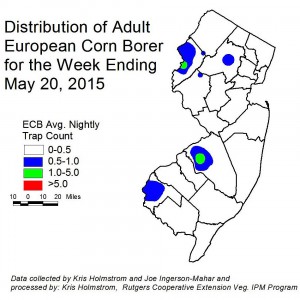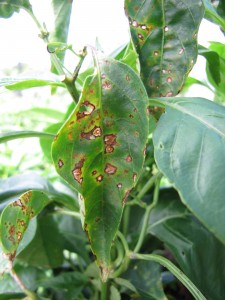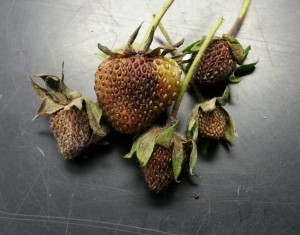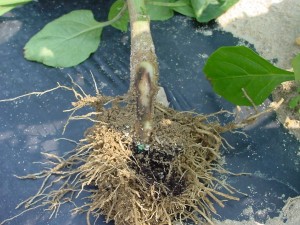- There have been no new reports of basil downy mildew in NJ this past week.
- Rhizoctonia has been found in a number of newly transplanted crops where the root ball has remained on the dry side. It’s important to get drip irrigation or overhead going on newly transplanted crops as soon as possible during extended hot, dry weather.
- No reports of cucurbit downy mildew or late blight in region to date.
Vegetable Crops Edition
Seasonal updates and alerts on insects, diseases, and weeds impacting vegetable crops. New Jersey Commercial Vegetable Production Recommendations updates between annual publication issues are included.
Subscriptions are available via EMAIL and RSS.
Quick Links:
 NJ Commercial Vegetable Production Recommendations
NJ Commercial Vegetable Production Recommendations
 Rutgers Weather Forecasting - Meteorological Information important to commercial agriculture.
Rutgers Weather Forecasting - Meteorological Information important to commercial agriculture.
Vegetable Disease Briefs – 5/25/15
Veg IPM Update: Week Ending 5/20/15
Sweet Corn
European corn borer (ECB) adults are being captured with increasing frequency now. At the present, areas of highest activity include Burlington and Warren counties (see ECB map). Cooler nights for later this week may suppress catches for the next several days.Most early sweet corn plantings are too young to support ECB larval infestations. However, over the next two weeks we should begin to see feeding in the most advanced plantings. Be sure to begin monitoring the earliest plantings for ECB feeding while they are still in the whorl stage. For detailed information see:
| The highest nightly ECB catches for the previous week are as follows: | ||
| Belvidere 2 | Allamuchy 1 | Port Colden 1 |
| Blairstown 2 | Califon 1 | Sergeantsville 1 |
| Denville 2 | Centerton 1 | Tabernacle 1 |
| Medford 2 | Pedricktown 1 | Woodstown 1 |
Vegetable Disease Briefs – 5/17/15
- There have been no new reports of basil downy mildew in New Jersey this past week.
- Late blight has been reported as far north as Northern Florida this spring.
- Cucurbit downy mildew has been reported as far north as Southern Georgia this spring.
Vegetable Disease Update – 5/17/15
Pepper
Bacterial leaf spot – Symptoms of bacterial leaf spot on pepper leaves include small, brown water-soaked lesions that turn brown and necrotic in the centers. Spots may coalesce and form large blighted areas on leaves and premature defoliation can occur. On fruit, brown lesions can form which have a roughened, cracked wart-like appearance. High temperatures, high relative humidity and rainfall favor Bacterial spot development. Loss from Bacterial spot can be reduced somewhat by maintaining high levels of fertility, which will stimulate new growth. Applying a fixed copper (M1) at labeled rates or may help suppress spread. Quintec (quinoxyfen, 13) at 6.0 fl. oz/A is now labeled for the suppression of bacterial leaf spot in pepper in the mid-Atlantic region. Please see the 2015 New Jersey Commercial Vegetable Production Recommendations Guide for more information.
[Read more…]
Understanding Strobilurin Fungicides (FRAC group 11) in 2015
The strobilurin, or QoI fungicides (FRAC group 11) are extremely useful in controlling a broad spectrum of common vegetable pathogens.
You may know some of older strobilurins as azoxystrobin (Quadris), trifloxystrobin (Flint), pyraclostrobin (Cabrio), or Pristine (pyraclostrobin + boscalid, 11 + 7). For example, FRAC group 11 active ingredients such as azoxystrobin are also now available in combination products as Quadris Top (azoxystrobin + difenoconazole, 11 + 3), Quilt (azoxystrobin + propiconazole, 11 + 3), or Quadris Opti (azoxystrobin + chlorothalonil, 11 + M5).
All strobilurin fungicides inhibit fungal respiration by binding to the cytochrome b complex III at the Q0 site in mitochondrial respiration. Simply said, the fungicide works by inhibiting the fungi’s ability undergo normal respiration. The strobilurin chemistries have a very specific target site, or mode-of-action (MOA).
Although highly effective, fungicide chemistries like those in FRAC group 11, with a very specific MOA, are susceptible to fungicide resistance development by some fungi. Why is that? In the strobilurin’s, a single nucleotide polymorphism of the cytochrome b gene leads to an amino acid substitution of glycine with alanine at position 143 of the cytochrome b protein.
For us, knowing the specifics on the technical jargon isn’t so important, it’s understanding what is at stake. So, if we hear someone speak about G143A resistance development to the QoI fungicides (where resistance is already known in cucurbit Powdery mildew and Downy mildew), we know what they are talking about and how important it is! So much so, if cucurbit powdery mildew develops resistance to one strobilurin compound it may develop what is known as cross resistance and become resistant to all chemistries in FRAC group 11, even if only one chemistry has been used!




